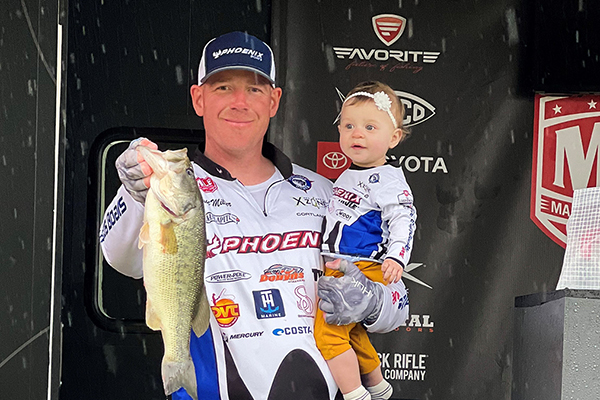Dave Miller
Our interview with Dave Miller. Dave is an up and coming bass angler from Stratford, Connecticut. For over a decade he’s competed at various levels of tournament fishing within Bassmaster and Major League Fishing, the two premier fishing organizations in the world. When off the water he focuses his attention on volunteering, through programs that benefit disabled veterans and mentoring youth. He also uses his platform to raise awareness for conservation and environmental issues such as invasive species. Outside of fishing and enjoying the outdoors, another passion of his is fitness where he maintains and promotes an active and healthy lifestyle. On and off the water, Dave strives to be a rising star in the sport — but also a positive role model!
 How did you learn about the Pitch-It campaign?
How did you learn about the Pitch-It campaign?
When I was competing within Connecticut B.A.S.S., we implemented the Pitch-It program and gave out bags to collect soft plastics. The amount we collected was astounding, and that made me want to get more involved with the program. I was blown away with how many baits and how much line we actually collected tournament after tournament.
Do you use soft plastic lures?
All the time. Beaver-style baits for flipping are a personal favorite. I’m a huge fan of flipping, and I like to think of flipping as one of my biggest strengths in bass fishing.
Favorite way of rigging soft plastics?
I use a Jungle hook with a fluorocarbon keeper on it. The keeper helps secure it in place, and I’ve found with the keeper not being a hard plastic, and not being metal, it doesn’t tear the bait as easily. It’s more forgiving, so your bait lasts longer and your chances of losing the bait are slimmer.
How do you ensure that you’re not losing soft baits out on the water?
For me, I go through a lot of baits during a tournament. In practice, I’ll reuse a lot of baits. After a fish or two, or after I get hung up, I’ll take that bait off and drop it in a bucket. I’ll use Mend-It to repair the bait and fill in the tears on the bait, and I’ll use those for the next day in practice.
On tournament day, I don’t take chances. I want the bait presentation to be an A+, so I’m constantly pulling off the bait and throwing a new one on through the tournament.
Why is it important that anglers are mindful of properly rigging and disposing of soft plastics?
To keep our fisheries healthy. I’ve seen it firsthand with smallmouth and largemouth on my home waters trying to pass baits. You’ll take a fish home, and it will have a stomach full of senkos. You might lose a bait today, and it might not get eaten for a week or two, but if a fish picks it up, it’ll cause issues.
I’ve seen fish struggle trying to pass baits that have been discarded. Whether someone broke it off, or they picked it up off the bottom, it affects their digestive tract, and they can’t eat.
Pitch-It started in response to a proposal in Maine to ban soft plastics. What would this mean for fishing?
Soft plastic baits are an integral part of the sport fishing industry. Not only are they used by anglers who sport fish but also by anglers who fish for a food source. Soft plastics are also an emerging market within the artificial bait market. More and more anglers are able to use their passion for fishing to create businesses for themselves and their families. An outright ban would not only be detrimental to the sport but would have irreparable impacts on the economy.
